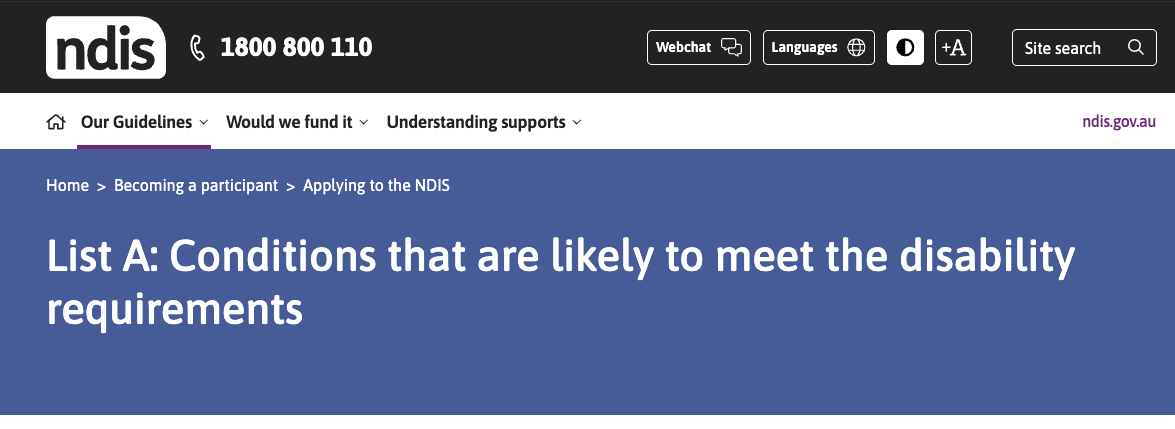Main Differences
Who each one is for
NDIS remains for people with a permanent and significant disability (early intervention also applies in some cases). Thriving Kids is a new, national program for children 0–8 with mild to moderate developmental delay or autism, delivered outside the NDIS.
Where supports come from
NDIS: individual plans and priced supports.
Thriving Kids: community and mainstream settings (child and family health, GPs, early learning, schools, phone/digital).
When it starts
Thriving Kids is expected to start 1 July 2026 and ramp up over 12 months. NDIS continues as usual.
Policy intent
Keep NDIS focused on permanent and significant disability; build an easier, earlier help pathway for children with milder needs.
Side-by-side: NDIS vs Thriving Kids
| Topic | NDIS (current) | Thriving Kids (new) |
| Who it serves | People with permanent and significant disability; early childhood approach now covers children younger than 9 inside NDIS | Children 0–8 with mild to moderate developmental delay or autism |
| How support is delivered | Individual plan budgets, price limits and provider marketplace | Local services: child health nurses, GPs, early learning and schools, plus digital/phone supports |
| Funding & oversight | NDIA/NDIS Act with Pricing Arrangements & Price Limits (PAPL) | Joint Commonwealth–state program; national design guided by advisory group and NDIS Review |
| Timing | Ongoing | From 1 July 2026, phased rollout over 12 months |
| If needs increase | Plan reassessment within NDIS | Pathway to seek NDIS access/reassessment if needs prove significant and permanent |
What the NDIS Covers Today
Think of the NDIS as a personalised package for people whose disability has an ongoing, substantial impact on everyday life. For children under 9, the early childhood approach sits within the NDIS and focuses on building capacity through family-centred supports. Plans are budgeted, price-limited and delivered by registered NDIS providers.
If needs change, you can seek a plan reassessment. The scheme also has clearer support lists now, so families can check what is and isn’t fundable before buying.
What Thriving Kids Will Cover
Thriving Kids is designed for younger children with milder needs who may not need an individual NDIS plan. Support comes through mainstream and community services you already know: your child health nurse, GP, local early learning centre, school inclusion programs and digital/phone supports. The aim is earlier help, closer to home, with simpler access.
It does not replace the NDIS for children whose disability is permanent and significant. Those children remain in the NDIS.
How to Tell Which Pathway Fits Your Child
Start with function, not labels:
- If your child’s needs are permanent and significantly affecting daily activities, the NDIS is likely the right pathway.
- If needs are mild to moderate, respond well to short-term strategies, and can be supported in everyday settings, Thriving Kids/mainstream is likely to fit.
Use the front door:
- For milder needs, begin with your child and family health nurse or GP for developmental screening and local referrals (speech, OT, psychology, parenting supports, inclusion at ELC/school).
If needs escalate, re-check NDIS eligibility:
- Keep simple, functional notes from school/ELC and health professionals. You can seek NDIS access or reassessment if things change.
What This Means for Families
- Less guesswork on spending (NDIS):
Clearer support lists mean fewer surprises when you claim. If in doubt, ask your provider to reference the list item on the quote. - More support close to home (Thriving Kids):
Many families will access help through the places they already go – GPs, child health, early learning, schools – rather than applying for an individual plan. - No sudden cliff-edge:
Existing NDIS participants aren’t removed overnight. Thriving Kids is phased from 1 July 2026 with a 12-month ramp-up.
Timeline
- Now: NDIS support lists are in force; early childhood approach operates up to age 9 within the NDIS.
- From July 2025: Foundational supports (outside the NDIS) begin phasing in.
- From 1 July 2026: Thriving Kids begins; national ramp-up over 12 months.
- From mid-2026: A new NDIS needs-assessment model is expected to roll out.
Questions We Hear a Lot
Will we lose supports?
Not suddenly. If a child is better served in mainstream settings, your planner or coordinator should discuss timing and options with you. Keep notes about what’s working, school/ELC feedback and any risks if support stops.
Are community services ready?
Capacity will build during the ramp-up. Ask about wait lists, interim options and how school/ELC supports can start while you wait.
What if the mainstream pathway isn’t enough?
If needs are more significant or become permanent, you can seek NDIS access or reassessment. Your simple evidence trail will help.
A Quick Scenario:
- Mia, 4: Speech delay impacting clarity and confidence at kinder. Responds well to short, targeted blocks of speech therapy and coaching for parents. Likely Thriving Kids/mainstream, coordinated through child health + kinder.
- Noah, 7: Multiple disabilities with ongoing, substantial impact on daily living at home and school. Requires regular, multi-disciplinary support. NDIS remains the right pathway.
Your Next Best Steps
- Map your local supports: child health service, GP, ELC/school contacts, community health clinics.
- Keep a paper trail: brief notes on goals, what helps at home/school, and progress.
- If you have an NDIS plan: check the support lists before purchases to avoid declined claims.
- Set reminders: July 2025 (foundational supports), 1 July 2026 (Thriving Kids start), mid-2026 (new assessment model).
Where We Can Help
We know this can feel confusing. If you’d like a hand, our Support Coordination team can map local options, sanity-check NDIS purchases against the support lists, and help you document goals and progress so your child’s needs are clear, whichever pathway fits best.





